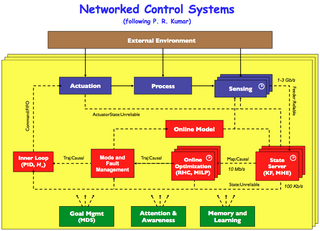Research Overview
This page contains a brief summary of my group's current research activities, broken up into the two main areas. More information is available on the individual project pages below and also in the recent publications from my group.
Analysis and Design of Biomolecular Feedback Systems
Feedback systems are a central part of natural biological systems and an important tool for engineering biocircuits that behave in a predictable fashion. The figure at the right gives a brief overview of the approach we are taking to both synthetic and systems biology. There are three main elements to our research:
- Modeling and analysis - we are working to develop rigorous tools for analyzing the phenotype of complex biomolecular systems based on data-driven models. We are particularly interested in systems involving feedback, since causal reasoning often fails in these systems due to the interaction of multiple components and pathways. Work in this are includes system identification, theory for understanding the role of feedback, and methods for building and analyzing models built using high-throughput datasets.
- In vitro testbeds - we are making use of both transcriptional expression systems and protein expression systems to develop "biomolecular breadboards" that can be used to characterize the behavior of circuits in a systematic fashion as part of the design process. Our goal is to help enable rapid prototyping and debugging of biomolecular circuits that can operate either in vitro or in vivo.
- Biocircuit design - engineered biological circuits required a combination of system-level principles, circuit-level design and device technologies in order to allow systematic design of robust systems. We are working on developing new device technologies for fast feedback as well as methods for combining multiple feedback mechanisms to provide robust operation in a variety of contexts. Our goal is to participate in the development of systematic methods for biocircuit design that allow us to overcome current limitations in device complexity for synthetic biocircuits.
Current projects:
- Cell-Free Expression of Membrane Proteins with Applications to Drug Discovery (Amgen)
- Establishing microfluidic cell-free systems for the rapid prototyping of synthetic genetic networks (HFSP)
- Improvement of E. coli transcription-translation (TX-TL) system (Caltech Grubstake)
- Theory-Based_Engineering of Biomolecular Circuits in Living Cells (AFOSR BRI)
- Model-guided Discovery and Optimization of Cell-based Sensors (ONR MURI)
- Programmable Molecular Technology Initiative (GBMF)
- Molecular Programming Project (NSF)
- Biomolecular Feedback Circuits for Modular, Robust and Rapid Response (ARO ICB)
Recent papers:
- Design and implementation of a synthetic biomolecular concentration tracker, V. Hsiao, E. L. C. de los Santos, W. R Whitaker, J. E. Dueber, R. M. Murray. ACS Synthetic Biology, 2014.
- Linear DNA for rapid prototyping of synthetic biological circuits in an Escherichia coli based TX-TL cell-free system, Z. Z. Sun, E. Yeung, C. A. Hayes, V. Noireaux, R. M. Murray. ACS Synthetic Biology, 2013
- Timing molecular motion and production with a synthetic transcriptional clock, E. Franco, E. Friedrichs, J. Kim, R. Jungmann, R. Murray, E. Winfree, F. C. Simmel. Proceedings of the National Academy of Science (PNAS), 2011.
Design of Reactive Protocols for Networked Control Systems
We are investigating the specification, design and verification of distributed systems that combine communications, computation and control in dynamic, uncertain and adversarial environments. Our goal is to develop methods and tools for designing control policies, specifying the properties of the resulting distributed embedded system and the physical environment, and proving that the specifications are met. We have recently developed a promising set of results in receding horizon temporal logic planning that allow automatic synthesis of protocols for hybrid (discrete and continuous state) dynamical systems that are guaranteed to satisfy the desired properties even in the presence of environmental action. The desired properties are expressed in the language of temporal logic, and the resulting system consists of a discrete planner that plans, in the abstracted discrete domain, a set of transitions of the system to ensure the correct behaviors, and a continuous controller that continuously implements the plan. Application areas include autonomous driving, vehicle management systems, and distributed multi-agent systems.
Current projects:
- Resilient Risk-Aware Autonomy for the Exploration of Uncertain and Extreme Environments (KISS/JPL)
- The TerraSwarm Research Center (FCRP)
- iCyPhy: Industrial Cyber-Physical Systems (IBM/UTC)
- Correct-by-Construction Synthesis of Control Protocols for Aerospace Systems (Boeing)
Recent papers:
- Synthesis of Control Protocols for Autonomous Systems, Tichakorn Wongpiromsarn, Ufuk Topcu, Richard M Murray. Unmanned Systems, 2013.
- Synthesis of Reactive Switching Protocols from Temporal Logic Specifications, Jun Liu, Necmiye Ozay, Ufuk Topcu, Richard M Murray. IEEE Transactions on Automatic Control, 2013.
- Receding Horizon Temporal Logic Planning, Tichakorn Wongpiromsarn, Ufuk Topcu, Richard M Murray. IEEE Transactions on Automatic Control, 2012.

